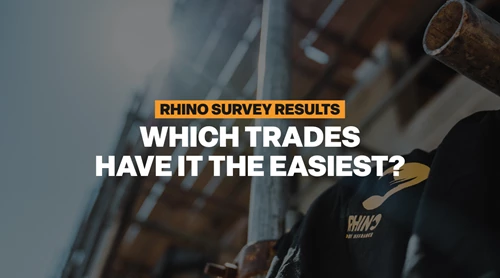
Which Trades Have It Easiest?
Rhino’s 2024 survey asked tradespeople a loaded question: what is the hardest trade? The answers could shock, or leave you unsurprised!
In the trades industry, staying ahead of the game is crucial for the success of your business. With environmental concerns on the rise and advancements in technology reshaping various sectors, the question of whether your trade business should invest in an electric van in 2024 is more relevant than ever.
Over the past few years, there has been a noticeable shift towards sustainability in various industries, and transport is no exception. The push for greener alternatives has given rise to electric vehicles (EVs), which are becoming increasingly popular among consumers and businesses alike.
The Rise of Electric Vans
One significant development in the electric vehicle market is the emergence of electric vans - you may have spotted delivery drivers now using EVs. These eco-friendly alternatives offer several advantages over their traditional counterparts, making them an enticing option for tradesmen and women in the UK.
One of the primary reasons businesses are considering electric vans is their reduced environmental impact. With the UK government's commitment to achieving net-zero carbon emissions by 2050, adopting electric vehicles aligns with the broader goal of reducing climate change.
Electric vans produce fewer carbon emissions compared to diesel or petrol, contributing to cleaner air and a healthier environment. This shift towards sustainability can also enhance your business's reputation as an environmentally responsible one, potentially attracting more customers.
While the initial investment in an electric van may seem higher than that of a traditional vehicle, the long-term cost savings can outweigh the upfront expenses.
Electricity tends to be more cost-effective than petrol or diesel, resulting in lower fuel expenses. With the continuous improvement in charging infrastructure and the availability of government incentives, the cost of operating an electric van is becoming more competitive.
Electric vehicles generally have fewer moving parts than traditional vehicles, translating to lower maintenance costs. The absence of complex components such as exhaust systems and fewer oil-related issues contributes to reduced servicing expenses over the vehicle's lifespan.
To encourage electric vehicles, the UK government has implemented various incentives that can significantly benefit your trade business.
The Plug-in Grant provides a discount on the purchase price of eligible electric vans, making them more affordable for businesses. Understanding what the eligibility criteria and application process for this grant can help you maximise your savings.
Electric vehicles often qualify for tax benefits, including reduced vehicle tax and favourable allowances. These financial incentives can contribute to your business's overall profitability.
Many UK cities are implementing low-emission zones to address air quality issues. Electric vehicles, including vans, are typically exempt or subject to lower charges in these zones. By investing in an electric van, your business gains unrestricted access to areas where traditional vehicles may face restrictions or additional costs.
As the auto industry continues to transition towards electric vehicles, investing in an electric van can future-proof your trade business. Adapting to changing trends and consumer preferences positions your business for long-term success and sustainability.
While the advantages of electric vans are obvious, it's essential to carefully evaluate whether they align with the precise needs and circumstances of your trade business. Consider the following factors before making the switch to electric vehicles:
Electric vans have made significant strides in extending their range, but it's crucial to assess whether the current capabilities meet your business requirements. Additionally, consider the availability and accessibility of charging infrastructure in your operational areas. Plan your routes and ensure that charging stations are strategically located to minimise downtime.
While the long-term cost savings are appealing, the initial investment in electric vans can be a barrier for some trade businesses. Evaluate your budget and explore financing options or government grants to ease the financial burden. Do a full cost-benefit analysis to determine the return on investment over the vehicle's lifespan.
Charging times for electric vans can vary depending on the charging method and the vehicle's battery capacity. Consider how charging times align with your business operations. Fast-charging options are becoming more prevalent, but it's essential to factor in potential delays during busy workdays.
Evaluate the payload capacity of electric vans compared to traditional vehicles. While advancements are being made in this area, it's crucial to ensure that an electric van can accommodate the tools and equipment essential to your trade without compromising efficiency.
Research the available electric van models and their specifications. Consider different factors such as the size, load capacity, and additional features that may enhance your business operations. Test-driving different models will provide valuable insights into their performance and suitability for your trade.
If you've decided that an electric van is the right fit for your trade business, here are practical steps to transition:
Research financing options available for electric vehicles, including loans, leases, and government grants. Determine the most cost-effective approach for acquiring electric vans while considering your budget constraints.
Establish a charging infrastructure plan. Identify suitable locations for charging stations and explore charging network providers. Having a well-thought-out charging strategy is crucial for minimising downtime and optimising operational efficiency.
Promote your transition to electric vans as part of your commitment to environmental sustainability. Leverage your eco-friendly practices in your marketing efforts to attract environmentally conscious customers. Highlighting your green initiative can set your business apart in a competitive market.
The decision to transition your trade business to electric vans in 2024 is an interesting one, requiring careful consideration of environmental, financial, and operational factors. While the advantages of electric vehicles are clear, it's essential to align the transition with the specific needs and goals of your business.
And with that, don't forget to get your trade insurance sorted. We at Rhino Trade Insurance can help sort inexpensive and quality cover for almost all types of trades. Get your bespoke quote today.
Rhino’s 2024 survey asked tradespeople a loaded question: what is the hardest trade? The answers could shock, or leave you unsurprised!
Self-employment is booming in the UK, especially among tradespeople who value freedom, flexibility, and higher earning potential. Backed by our own survey data from over 500 tradespeople, this article dives into why so many in the industry choose to go it alone, despite the risks.
Rhino’s 2024 survey found nearly half of tradespeople would run out of money within 3 months if they couldn’t work. Learn how insurance can help you stay afloat.
Tell us your trade and get a tailored insurance quote for your business in seconds
Our team of experts are available to talk to Mon-Fri 08.30-17.30 and Sat 10.00-14.00

